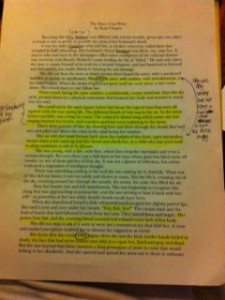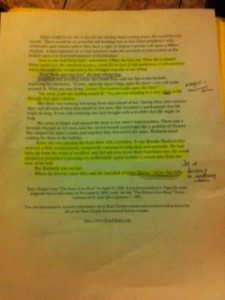In the short story “The Story of an Hour” by Kate Chopin i notice a pattern, Mrs. Mallard (Louise) had Heart problems which meant that any harsh news or situation could trigger her a heart attack. When Louise received the tragic news about her husband’s death she did not fainted or got any heart attack. Louise just wept and went to her room. Throughout the the story Louise was weeping and stopped when she thinks about her new beginning and freedom without Brently, but she would weep again when she picture brently dead cold body in front of her. Louise weeping represented the sorrow and happiness she had. sorrow of her husband death and her happiness of becoming an free women maybe because she did not have a great relationship with him.
The open window represents freedom and opportunities that her future has for her after her husband has died. From the window Louise sees the blue sky with fluffy clouds and treetops. She hears people and birds singing / twittering and smells the rain in the air. Everything that she experiences through her senses means joy and spring the season. The open window provides a clear, bright view into the distance and Louise’s own bright future.
Also at the end of the the story when Brently walked into the house everyone was shock that he was alive but Louise future and freedom was out the window. Louise did not died from heart disease but because of the joy that she was going to be an independent women.






Hi Jonathann,
It is interesting how you though “Mrs. Mallard did not die from heart disease but because of the joy that she was going to be an independent women”. Now that I think about the phrase “joy that kills” I feel like that could be a good point. I took that as, she died of the fact that now that her husband is alive, she might not have that freedom she prayed for. “Her joy” was interrupted.
I also felt Mrs. Mallard is feeling both sorrow and happiness after her husband’s death.
Great post by the way.
Both of you interpret the last line to indicate that the joy that killed Mrs. Mallard was not actual joy, or not the same joy that those present in the room imagine it was. What in the story gives you that sense? I ask because some read this and do not get the same sense at the end that you both do, despite your slightly different interpretations of what exactly that joy was and how it killed.
The significance of the window, and of what is outside the window, is a great reading of the opportunity Mrs. Mallard thinks she has. I especially like how @jonathann links this to the idiom “out the window” to explain how what she has seen will not be hers.